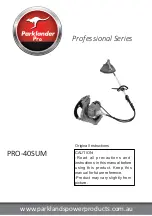
13
GB
WARNING! – Always wear protective
gloves during maintenance operations. Do not
carry out maintenance with the engine hot.
AIR FILTER
Every 8-10 working hours, remove the cover (A,
Fig. 19), clean the filter (B).
Blow with compressed air, at a distance.
Replace if dirty or damaged. The engine runs
irregularly if the filter is clogged, with consequent
higher consumption and lower performance.
FUEL FILTER
Check fuel filter periodically. A dirty filter can cause
difficult starting and lower engine performance.
To clean filter proceed as follows: remove it from
fuel filling hole. Replace it (Fig. 17) if too dirty.
ENGINE
Clean cylinder fins with a brush or compressed
air periodically. Dangerous overheating of engine
may occur due to impurities on the cylinder.
SPARK PLUG
Clean spark plug and check electrode distance
periodically (Fig. 18). Use TORCH L6RTC or of other
brand with the same thermal grade.
GEAR HOUSING
Every 30 working hours, remove screw (D, Fig. 6)
on the gear housing and check the quantity of
grease. Do not use more than 10 grams. Use high
quality molybdenum bisulfide grease.
Never use fuel for cleaning operations.
TRASMISSION
Grease the joints of the flexible (B, Fig.20) every
20 working hours with molybdenum disulfide.
Grease the joints of the rigid tube (D, Fig. 20) every
30 working hours with molybdenum disulfide.
CARBURETOR
Before adjusting the carburetor, clean the air filter
(B, Fig. 19) and warm up the engine.
BLADE SHARPENING (2-3-4 TOOTH)
1. Blades are reversible: when one side is no
longer sharp, the blade can be turned over
and used on the other side (Fig. 13).
2. Blades are sharpened using a flat single-cut
file (Fig. 13).
3. To maintain the correct balance, file all cutting
edges uniformly.
4. If the blades are not sharpened correctly, this
can set up abnormal vibrations in the machine
and cause the blades themselves to break
ultimately.
WARNING! – The wrong type of cutter or
an incorrectly sharpened blade will increase the
risk of kickback. Check mower blades for
deterioration or cracks, and replace if damaged.
WARNING: Never repair damaged
cutting attachments by welding,
straightening or modifying the shape. This
may cause parts of the cutting tool to come
off and result in serious or fatal injuries.
NYLON LINE HEAD
Only use line of the same diameter as the original
to avoid overloading the engine (Fig. 14).
In order to get more line out of the cutting head,
tap it lightly on the ground while working.
Note: Never hit the nylon head against hard spots
such as concrete or stones, it could be dangerous.
Replacing the nylon line on the TAP&GO
trimmer head (Fig.15)
1 - Press the tab (1, Fig. 15) and remove the cover
and the internal spool.
2 - Double back the line, leaving one end 14 cm
longer than the other one. Lock the line in the
notch (2, Fig. 15). Wind the line in the direction
of the arrow, each end in its chink, regulary,
without crossing them.
3 - At the end of the winding, lock in the slits (3,
Fig. 15) Assemble the spring. Thread the line
through the eyelets (4) (fig.15), secure the
head with the cover (5) and then pull the line
outwards from the head (6).
Summary of Contents for BCH 40 BP
Page 2: ...6 4 5 C D B A 1 2 1 2 3 3 N N 8 7 14 9 10 11 12 19 22 20 21 16 17 15 18 13 ...
Page 3: ...H I L M Q P O F C L H N F D H F R C B L B A D A D 4 5A 6 7 5B 8 9 E F B G A D B C ...
Page 4: ...B 1 2 3 A CLOSE B OPEN MAX 12 15 cm 12 15 cm Ø 2 4 mm Ø 2 4 mm 8 10 12 11 13 14 15 A ...
Page 6: ......
Page 7: ...English 2 Français 20 Español 40 Pуccкий 60 Hrvatski 80 Українська 99 ...
Page 125: ...NOTE ...
Page 126: ...NOTE ...
Page 127: ......
















































